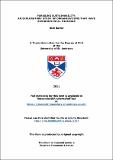Files in this item
Pursuing sustainability : an exploratory study of organisations that have environmental missions
Item metadata
| dc.contributor.advisor | Bebbington, Kathryn J | |
| dc.contributor.author | Barter, Nicholas J. | |
| dc.coverage.spatial | 388 | en_US |
| dc.date.accessioned | 2011-03-22T10:07:11Z | |
| dc.date.available | 2011-03-22T10:07:11Z | |
| dc.date.issued | 2011-06-22 | |
| dc.identifier.uri | https://hdl.handle.net/10023/1707 | |
| dc.description.abstract | Numerous management scholars argue that management theory is anthropocentric and considers humans as being separate from the environment. Further anthropocentrism does not enable theory and organisations to contribute to sustainable development. To counter this it is argued theory and organisations should embrace an environmental paradigm that does not separate humans and the environment. This exploratory research attempts to identify whether any organisations operate with an environmental paradigm. The research questions focus on paradigms and some of the tensions surrounding the human-environment debate, such as; sufficiency versus profit maximisation and quoted status, money as a means or an end and notions of boundaries between the organisation and the environment. The questions are explored with individuals from 23 environmentally focused, primarily for profit, organisations. The results indicate that the organisations operate with an environmental paradigm, do not perceive of boundaries between the organisation and the environment, do not pursue profit maximisation, can demonstrate sufficiency, view money as a means rather than an end and do not have a favourable view of quoted status. Furthermore, the interviewees do not separate their world into two realms, one social and one natural. Narratives that arise include the organisations operating to a mode of mission and money and that an aphorism of “altruistically selfish and selfishly altruistic” (Maturana & Varela, 1998:197) can be applied. In short, the results indicate some challenges to conventional management theory, in particular strategy and competitive advantage, and that the organisations interviewed could help to, some extent, enable sustainable development. To close, the hope of this study it that its narratives and the conceptual tool it has prompted, provide succour to students and managers who want to develop a ‘future normal’ of theories and organisations that better enable sustainability. | en_US |
| dc.language.iso | en | en_US |
| dc.publisher | University of St Andrews | |
| dc.rights | Creative Commons Attribution-NonCommercial-NoDerivs 3.0 Unported | |
| dc.rights.uri | http://creativecommons.org/licenses/by-nc-nd/3.0/ | |
| dc.subject | Paradigms | en_US |
| dc.subject | Sustaincentrism | en_US |
| dc.subject | Actor-network theory | en_US |
| dc.subject | Environmental missions | en_US |
| dc.subject.lcc | HD30.255B2 | |
| dc.subject.lcsh | Business enterprises--Environmental aspects | en_US |
| dc.subject.lcsh | Business enterprises--Environmental aspects--Case studies | en_US |
| dc.subject.lcsh | Social responsibility of business | en_US |
| dc.subject.lcsh | Social responsibility of business--Case studies | en_US |
| dc.subject.lcsh | Environmental responsibility | en_US |
| dc.subject.lcsh | Environmental responsibility--Case studies | en_US |
| dc.subject.lcsh | Paradigms (Social sciences) | en_US |
| dc.title | Pursuing sustainability : an exploratory study of organisations that have environmental missions | en_US |
| dc.type | Thesis | en_US |
| dc.type.qualificationlevel | Doctoral | en_US |
| dc.type.qualificationname | PhD Doctor of Philosophy | en_US |
| dc.publisher.institution | The University of St Andrews | en_US |
This item appears in the following Collection(s)
Except where otherwise noted within the work, this item's licence for re-use is described as Creative Commons Attribution-NonCommercial-NoDerivs 3.0 Unported
Items in the St Andrews Research Repository are protected by copyright, with all rights reserved, unless otherwise indicated.


